sheriff
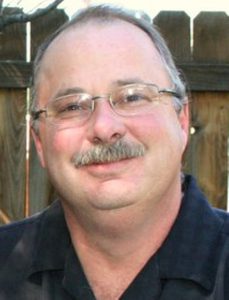 My brother-in-law, Chris Hadlock has had a long and successful career in law enforcement. As a young married man, Chris was working in sales, which as most of us know, is a career that some like and some don’t. Chris was good at it, but the career was not a fulfilling one for him. While they were living in Fort Morgan, Colorado, Chris told my sister, Allyn that he really wasn’t happy doing what he was doing, and simply couldn’t see himself doing it for a long term career. She asked him what he thought he wanted to do, and he told her that while he didn’t think he could be a doctor, he wanted a career in which he could help people. He wanted to be a police officer. I think that prospect really scared my sister at first, and after going on a few ride alongs with my brother-in-law, in which it looked like he might have to pull his gun on someone, I can understand why that could bother my sister. Nevertheless, my brother-in-law was a very capable patrol officer, and with his tall 6’4″ stature, the perpetrators seldom felt inclined to try to go up against him. While some of the shorter officers had to struggle to apprehend a perpetrator, Chris would walk up, and the guy would take one look at him and surrender.
My brother-in-law, Chris Hadlock has had a long and successful career in law enforcement. As a young married man, Chris was working in sales, which as most of us know, is a career that some like and some don’t. Chris was good at it, but the career was not a fulfilling one for him. While they were living in Fort Morgan, Colorado, Chris told my sister, Allyn that he really wasn’t happy doing what he was doing, and simply couldn’t see himself doing it for a long term career. She asked him what he thought he wanted to do, and he told her that while he didn’t think he could be a doctor, he wanted a career in which he could help people. He wanted to be a police officer. I think that prospect really scared my sister at first, and after going on a few ride alongs with my brother-in-law, in which it looked like he might have to pull his gun on someone, I can understand why that could bother my sister. Nevertheless, my brother-in-law was a very capable patrol officer, and with his tall 6’4″ stature, the perpetrators seldom felt inclined to try to go up against him. While some of the shorter officers had to struggle to apprehend a perpetrator, Chris would walk up, and the guy would take one look at him and surrender.
Of course, his height was not the only reason that Chris had no trouble apprehending a suspect, however. He  has a very calming nature. Whether he is doing police work, or just calming jangled nerves in a stressful situation, Chris has the unique ability to de-escalate a situation. He has done so on many occasions, both in and out of police work. One occasion I specifically recall was when he went to arrest a man, and when the man opened the door to Chris’ knock, and saw that it was a cop, he tried to shut the door again. Chris simply stuck his Billy Club in the door, and calmly said, you don’t want to do this. The man calmed down, and agreed to go with Chris. He then asked if he could make a phone call first, and because he was cooperative, Chris allowed it, knowing that he would also be allowed a second phone call at the jail. He didn’t have to allow the man to do that, but the arrest went very smoothly and I believe that the main reason is because Chris worked with the man and kept him calm. I also had the opportunity to see police officers who wouldn’t work with a perpetrator, and the whole situation blew up. It’s all in how the officer handles the situation.
has a very calming nature. Whether he is doing police work, or just calming jangled nerves in a stressful situation, Chris has the unique ability to de-escalate a situation. He has done so on many occasions, both in and out of police work. One occasion I specifically recall was when he went to arrest a man, and when the man opened the door to Chris’ knock, and saw that it was a cop, he tried to shut the door again. Chris simply stuck his Billy Club in the door, and calmly said, you don’t want to do this. The man calmed down, and agreed to go with Chris. He then asked if he could make a phone call first, and because he was cooperative, Chris allowed it, knowing that he would also be allowed a second phone call at the jail. He didn’t have to allow the man to do that, but the arrest went very smoothly and I believe that the main reason is because Chris worked with the man and kept him calm. I also had the opportunity to see police officers who wouldn’t work with a perpetrator, and the whole situation blew up. It’s all in how the officer handles the situation.
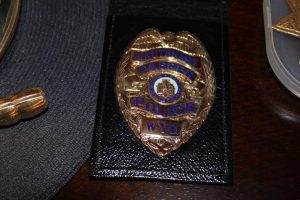 These days, with so much turmoil surrounding our police officers, much of which is not their fault, and yet any arrests are looked at as Police Brutality, my brother-in-law is a police officer who brings peace, a sense of calm, and yet justice. Chris has advanced in his career from a Deputy Sheriff, to a City Patrolman, a Sergeant, and now a Lieutenant over the detectives. He has been a training officer, and a hiring officer, and now he is spending several weeks out of this summer a “Leadership in Policing” class. Chris has been an asset to both of the departments he has served in. He is a born leader and we are very proud of him. Today is Chris’ birthday. Happy birthday Chris!! Have a great day!! We love you!!
These days, with so much turmoil surrounding our police officers, much of which is not their fault, and yet any arrests are looked at as Police Brutality, my brother-in-law is a police officer who brings peace, a sense of calm, and yet justice. Chris has advanced in his career from a Deputy Sheriff, to a City Patrolman, a Sergeant, and now a Lieutenant over the detectives. He has been a training officer, and a hiring officer, and now he is spending several weeks out of this summer a “Leadership in Policing” class. Chris has been an asset to both of the departments he has served in. He is a born leader and we are very proud of him. Today is Chris’ birthday. Happy birthday Chris!! Have a great day!! We love you!!
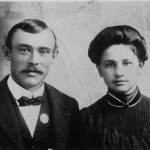
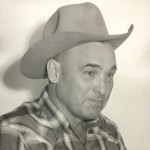 My curiosity about some of the family members on my husband, Bob’s side of our family, has led me to research the Forsyth, Montana area, because after all, that is where many of them lived for much of their lives. Some, including Julia (Doll) Schulenberg, and her husband, Max homesteaded here, until floods and droughts ruined their chances of making a living there. Then they moved into the little town of Forsyth, Montana, where they would live out their lives and raise their ten children, the oldest of whom was my husband, Bob’s grandfather, Andrew Schulenberg. Andy was the sheriff of Rosebud County from 1955 to 1972, in spite of the fact that he had lost his lower leg in a shooting accident when he was fifteen years old. To me that is rather an amazing feat for the times. Artificial legs of this day and age could probably facilitate an officer of the law’s need to run, but in those days, they did not have the technology to spring load the leg for running. During his term as sheriff, Andy became a much loved sheriff and citizen of the area, while also keeping the peace in the county.
My curiosity about some of the family members on my husband, Bob’s side of our family, has led me to research the Forsyth, Montana area, because after all, that is where many of them lived for much of their lives. Some, including Julia (Doll) Schulenberg, and her husband, Max homesteaded here, until floods and droughts ruined their chances of making a living there. Then they moved into the little town of Forsyth, Montana, where they would live out their lives and raise their ten children, the oldest of whom was my husband, Bob’s grandfather, Andrew Schulenberg. Andy was the sheriff of Rosebud County from 1955 to 1972, in spite of the fact that he had lost his lower leg in a shooting accident when he was fifteen years old. To me that is rather an amazing feat for the times. Artificial legs of this day and age could probably facilitate an officer of the law’s need to run, but in those days, they did not have the technology to spring load the leg for running. During his term as sheriff, Andy became a much loved sheriff and citizen of the area, while also keeping the peace in the county.
Before the town of Forsyth, Montana existed, the river steamers used to stop in the area to refuel their engines. The area had an abundance of cottonwood trees and that made it a perfect fuel location. To this day, Forsyth is known as the city of trees. The town sits along the Yellowstone River, and it got its name from General James W Forsyth, who stopped there on one of those river steamers, before there was even a town. The town would be established in 1880, and the post office would be established in 1882 when the Northern Pacific Railroad extended into the Judith Basin, which opened up the territory for settlement. It is located along 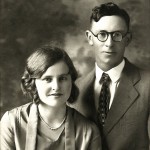
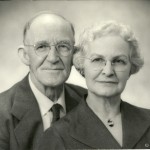 the Lewis and Clark Trail, which peaks my curiosity even more.
the Lewis and Clark Trail, which peaks my curiosity even more.
Max and Julia Schulenberg weren’t the only side of Bob’s family to settle in Forsyth. The Knox side of the family lived there too. Shortly after the death of their son, Joy Allen Knox, Bob’s maternal great grandparents, Edgar and Nellie (DeGood) Knox, moved from Prosser County, Washington to the Rosebud area to work on a ranch there. While Bob’s grandfather was not born in the area, he lived there until the early 1960s when they would move to Casper, Wyoming, which is where their daughter, Joann and her husband, Walter Schulenberg, who are Bob’s parents had moved. While Walt and Joann would never live in Montana again, Forsyth would remain an important part of their lives. Forsyth was, after all, an area where they had deep roots, connected to both sides of their family. With the move of the Knox family, the connection to Forsyth for that side of the family ended, however. Still the Schulenberg/Hein/Leary side of the family continues to have deep roots there to this day, and a number of the family members still live right there in Forsyth.
One of the things that I had always found very interesting about Forsyth is the cross on the hill. I always thought it was great that the town had decided to place the cross there, but now I find out that it was not the town at all. The cross, which has become a tourist attraction, as well as a source of inspiration and hope for the people of the area, was actually placed there early in the Fall of 1960 by the youth group of Concordia Lutheran Church. The idea was that of one of the youth group members, and was so well received by the entire 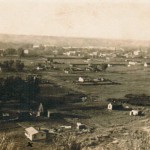
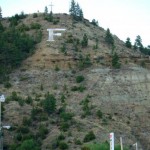 youth group, that they all gave up their Saturdays to dig the hole for the pole and the anchor on the top of the hill to the south of Forsyth. The cross was first lit up on the second Monday evening in November of 1960. Over the next sixteen years, the cross remained lit and was kept up by contributions from individuals, businesses, tourists and organizations. I’m not sure if it is still lit these days, but it remains on the top of the hill. I’m sure there is much more history that I will discover as I continue to study the area where Bob’s family has such deep roots. I look forward to doing more research very soon.
youth group, that they all gave up their Saturdays to dig the hole for the pole and the anchor on the top of the hill to the south of Forsyth. The cross was first lit up on the second Monday evening in November of 1960. Over the next sixteen years, the cross remained lit and was kept up by contributions from individuals, businesses, tourists and organizations. I’m not sure if it is still lit these days, but it remains on the top of the hill. I’m sure there is much more history that I will discover as I continue to study the area where Bob’s family has such deep roots. I look forward to doing more research very soon.
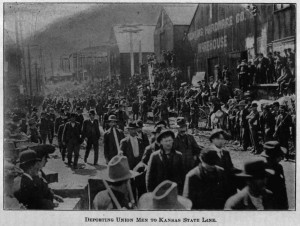 I think a lot of people know or at least have heard of Cripple Creek, Colorado. Most people think of the fourteen casinos located there, and I suppose that casinos are a fitting thing for Cripple Creek to be known for, but it wasn’t always that way. Cripple Creek became a gold mining boom town in 1894 after gold was discovered there. At that time 150 gold mines suddenly sprang up, and with them, a strong miners union…the Free Coinage Union Number 19, which was a part of the militant Western Federation of Miners.
I think a lot of people know or at least have heard of Cripple Creek, Colorado. Most people think of the fourteen casinos located there, and I suppose that casinos are a fitting thing for Cripple Creek to be known for, but it wasn’t always that way. Cripple Creek became a gold mining boom town in 1894 after gold was discovered there. At that time 150 gold mines suddenly sprang up, and with them, a strong miners union…the Free Coinage Union Number 19, which was a part of the militant Western Federation of Miners.
As with any gold mining operation, desparate workers began pouring in from all over the country. Before long Cripple Creek had a huge labor surplus. With the labor surplus, the owners begin requiring extra hours, with no pay increase, or the alternative, they could keep the current 8 hours a day with a pay reduction of 50 cents. The Western Federation of Miners opposed both plans, and the miners when on strike. Their picket lines and refusal to work closed most of the mines. They showed what solidarity is all about. The miners who were still going down in the 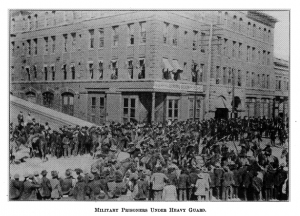 working mines assessed themselves 10 percent of their wages to support the strikers, and the union set up soup kitchens. How often to you see people who can’t afford to strike, but who are willing to support those who do strike.
working mines assessed themselves 10 percent of their wages to support the strikers, and the union set up soup kitchens. How often to you see people who can’t afford to strike, but who are willing to support those who do strike.
The governer of Colorado, David Waite would not help the labor bosses, but they had the county Sheriff, Frank Bowers in their pocket. They told the miners to go back to work, they would not. By the end of October, things had gotten so out of hand that finally, on November 23, 1903, Governor Peabody agreed to send the state miltia to protect replacement workers that the bosses had brought in. The striking miners were furious and they barricaded the roads and railways. The soldiers began rounding up the union members and their sympathizers, including the entire staff of a pro-union newspaper, and imprisoned them without charges or any evidence that they had done anything wrong.
The miners and others who were imprisoned complained that their constitutional rights had been violated, and 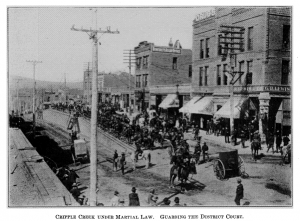
one anti-union judge replied, “To hell with the Constitution; we’re not following the Constitution!” Those tactics brought out the more radical elements of the Western Federation of Miners, and in June of 1904 Harry Orchard, who was a professional terrorist the the union employed, blew up a railroad station, whick killed 13 strikebreakers. With the bombing came the outrage of the public and the deportation of the Western Federation of Miners leaders. By midsummer, the strike was over and the Western Federation of Miners never regained the same level of power it had originally had in the Colorado mining districts. Even in this day and age, the unions and the bosses seem to always be at odds, and I suppose that something like this could happen again.
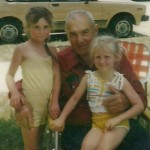 Everyone hopes that the marriages in their family will last forever, but sadly that is not always the way things work out. Bob’s grandparents on his dad’s side divorced when his dad was about 5, I believe and for many years, Bob’s dad would have nothing to do with his real dad. In fact, Bob would be a grown man with two daughters of his own before we would know anything more than that his grandpa was the sheriff of Forsyth, Montana for many years before he retired. The one thing we did know is that if your last name was Schulenberg in Forsyth, Montana, they knew who you were related to…the sheriff. He was a much loved sheriff for a long time.
Everyone hopes that the marriages in their family will last forever, but sadly that is not always the way things work out. Bob’s grandparents on his dad’s side divorced when his dad was about 5, I believe and for many years, Bob’s dad would have nothing to do with his real dad. In fact, Bob would be a grown man with two daughters of his own before we would know anything more than that his grandpa was the sheriff of Forsyth, Montana for many years before he retired. The one thing we did know is that if your last name was Schulenberg in Forsyth, Montana, they knew who you were related to…the sheriff. He was a much loved sheriff for a long time.
My father-in-law finally reconnected with his dad at a family reunion about 1980. We went to the family reunion the next time, and my girls were able to meet their great grandpa for the first time. We knew about the hard feelings from the past, but my father-in-law had decided to put that all behind him and be friends with his dad, so we felt comfortable getting to know him, knowing that we would not be hurting my father-in-law’s feelings.
The years had changed him from the man who could not seem to get along with grandma, to a much more mellow person…someone who maybe realized what he had missed out on through those many years of no contact. Bob and his family had visited Forsyth many times after moving to Wyoming, but the kids would not have known their grandpa if they saw him on the street…unless he was in uniform of course, but Bob doesn’t recall ever meeting him.
Grandpa would pass away before we got a chance to see him again, and much about him remains a mystery to us. We know that he remarried after the divorce, and had another son, who has stayed in contact with my father-in-law, and is a very nice man. We know that during his retirement years he made wooden lawn chairs, and he gave one to each of his great granddaughters. It will be the only thing they will have to remember him by…other than a couple of pictures. It is sad that so much of their heritage is lost to them, but that is the way it goes sometimes in a divorce. I will always be grateful that we had the chance to meet him, even if it was only once.

